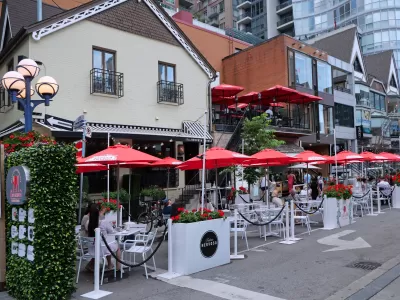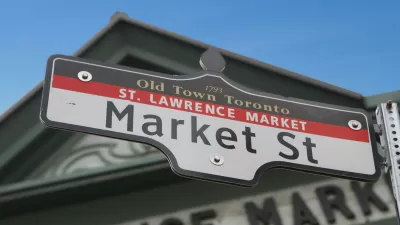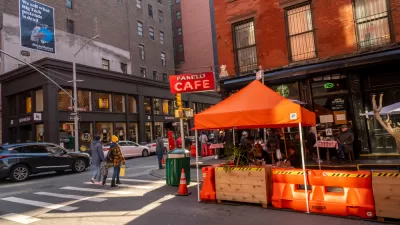New regulations and fees for outdoor dining patios, extended from a pandemic-era program, are making the process overly complicated and expensive for business owners.

In an opinion piece for the Toronto Star, Edward Keenan criticizes the Toronto for “ruining” the CaféTO outdoor dining program in the process of trying to make it permanent.
After the city reduced the onerous fees and rules imposed by a first draft of the program in January, applicants now say they are waiting months for approvals. For Keenan, this is unacceptable. “Let me make this as clear as I can: the patio season in Toronto is short, maybe 100 days a year. If the ‘detailed review’ process you’ve set up for patio approvals takes well into the warm weather patio season to conclude, then you’ve botched it.”
Here’s the core thing to understand: these patios make the city a better place — they are good for business, good for neighbourhoods, good for the liveliness of streets. We should be begging shopkeepers to install them. Instead we’ve made it difficult.
Keenan notes that this isn’t the only way the city finds “something we actively want or need people to do,” then makes residents “ jump through (often expensive) hoops to do it.” The same applies to building denser housing, Keenan writes.
For Keenan, this fails to internalize the lessons of the pandemic, which showed that “when our backs are against the wall, we can do things, through our government, together — and we can do them quickly.”
FULL STORY: We are slowly but surely killing the CaféTO patio program. Shame on us

Maui's Vacation Rental Debate Turns Ugly
Verbal attacks, misinformation campaigns and fistfights plague a high-stakes debate to convert thousands of vacation rentals into long-term housing.

Planetizen Federal Action Tracker
A weekly monitor of how Trump’s orders and actions are impacting planners and planning in America.

San Francisco Suspends Traffic Calming Amidst Record Deaths
Citing “a challenging fiscal landscape,” the city will cease the program on the heels of 42 traffic deaths, including 24 pedestrians.

Defunct Pittsburgh Power Plant to Become Residential Tower
A decommissioned steam heat plant will be redeveloped into almost 100 affordable housing units.

Trump Prompts Restructuring of Transportation Research Board in “Unprecedented Overreach”
The TRB has eliminated more than half of its committees including those focused on climate, equity, and cities.

Amtrak Rolls Out New Orleans to Alabama “Mardi Gras” Train
The new service will operate morning and evening departures between Mobile and New Orleans.
Urban Design for Planners 1: Software Tools
This six-course series explores essential urban design concepts using open source software and equips planners with the tools they need to participate fully in the urban design process.
Planning for Universal Design
Learn the tools for implementing Universal Design in planning regulations.
Heyer Gruel & Associates PA
JM Goldson LLC
Custer County Colorado
City of Camden Redevelopment Agency
City of Astoria
Transportation Research & Education Center (TREC) at Portland State University
Jefferson Parish Government
Camden Redevelopment Agency
City of Claremont




























